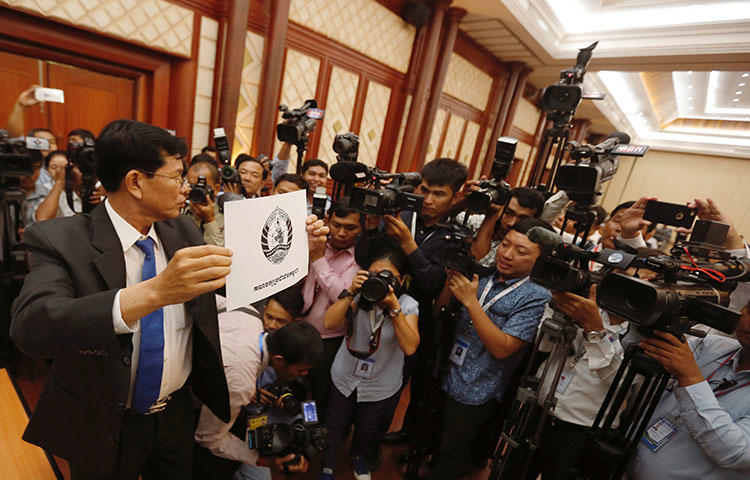Hong Kong, June 4, 2018–The Committee to Protect Journalists condemned today proposed restrictions on news coverage of upcoming elections in Cambodia and called on the country’s authorities to allow the media to report freely without fear of reprisal.
The National Election Committee (NEC), the country’s official election supervisor, issued last week a code of conduct for covering the election that bars journalists from expressing “personal opinion or prejudice” or publishing news that “affects political and social stability,” news reports said.
The commission’s code also bans reporters from conducting interviews at polling booths or broadcasting news that could cause “confusion and loss of confidence” in the election, which is scheduled for July 29, the reports said.
NEC spokesperson Hang Puthea said reporters would only be allowed to ask questions at polling stations with permission of the station’s head and that they would be barred from asking voters how they cast their ballots, according to reports.
Violations of the code will be punishable by fines of between 5 million to 30 million riel (US$1,250-US$7,400), reports said.
The government announced today that it would also seek to monitor and control any online news that aimed to cause “instability” during the election, Reuters reported. Three ministries would be tasked to “control news content, writing, audio, pictures, and videos, and in other forms which have intention to cause instability,” the report said citing an official government notice.
The credibility of the polls is in doubt after last year’s court-ordered dissolution of the Cambodia National Rescue Party, the country’s only viable opposition party, according to news reports quoting rights groups.
“Cambodia’s election reporting restrictions, if maintained, will ensure the polls have virtually no credibility as free and fair,” said Shawn Crispin, CPJ’s senior Southeast Asia representative. “Reporters should be allowed to report and opine freely on the elections without fear of reprisal. This ill-considered code of conduct should be scrapped.”
The restrictions on free reporting come amid a clampdown on independent media in Cambodia, according to CPJ research. In September, the English-language newspaper The Cambodia Daily closed under official pressure to pay alleged back taxes owed amounting to over US$6.3 million, CPJ reported at the time.
Prior to that, the Information Ministry had closed all local radio stations that broadcast the U.S. Congress-funded radio broadcasters Radio Free Asia (RFA) and Voice of America outside of the capital, according to news reports.
In September, RFA closed its 20-year-old in-country bureau after the government made similar tax and administrative violation threats, according to reports.
Two former RFA reporters, Yeang Sothearin and Uon Chhin, have been detained by authorities since November 14, 2017, on espionage charges of “illegally collecting information for a foreign source,” The Cambodia Daily reported at the time. If convicted under article 445 of the Criminal Code, they each face a maximum penalty of 15 years in prison.
The Phnom Penh Post, an English language newspaper, was sold to a Malaysian investor with past business ties to the government in April 2018 after its Australian owner was handed a multi-million dollar back tax bill. The paper’s editor, Kay Kimsong, was promptly sacked by the new owners and several staff members have since left the paper due to concerns about editorial independence, news reports said.
